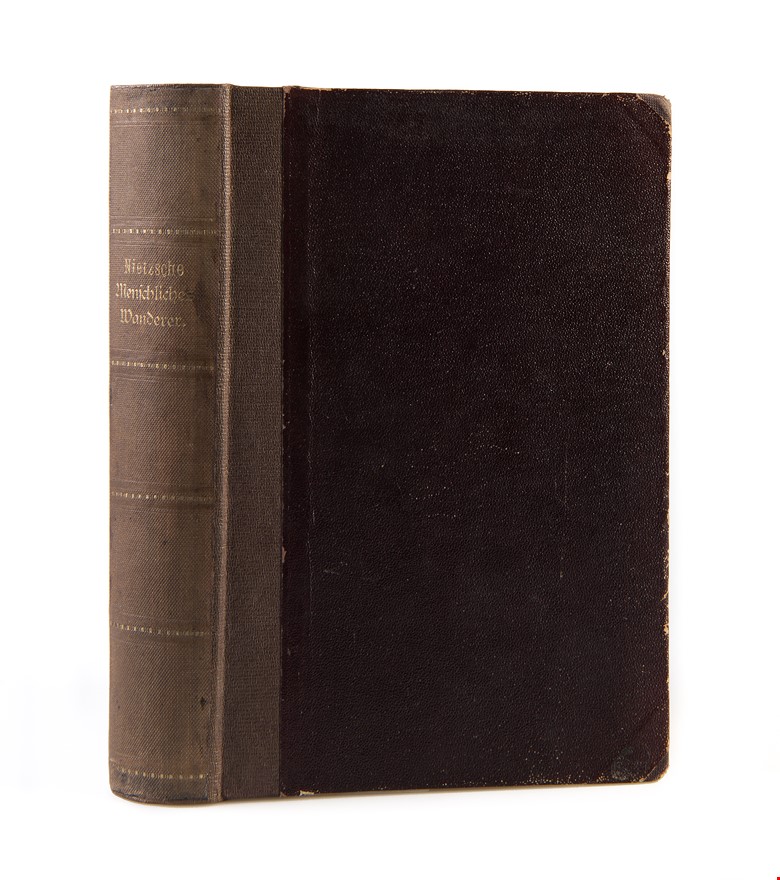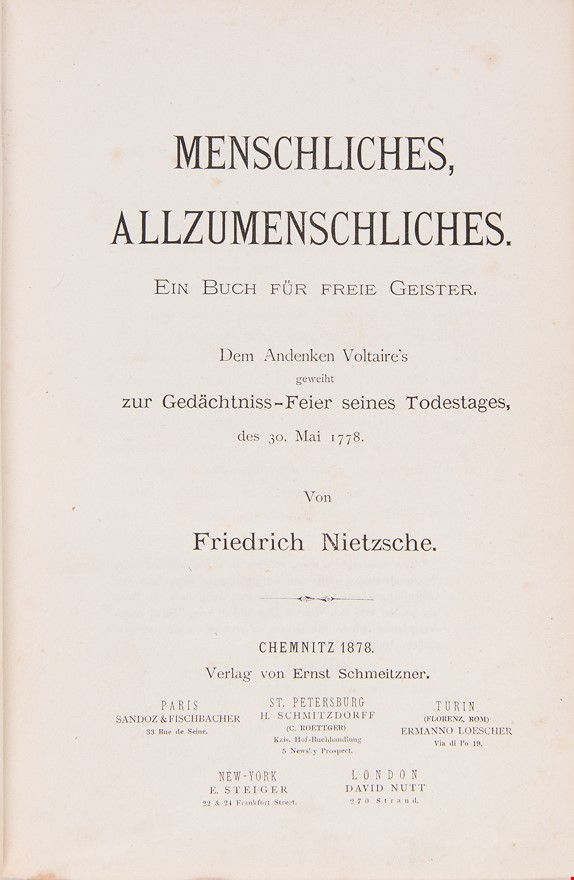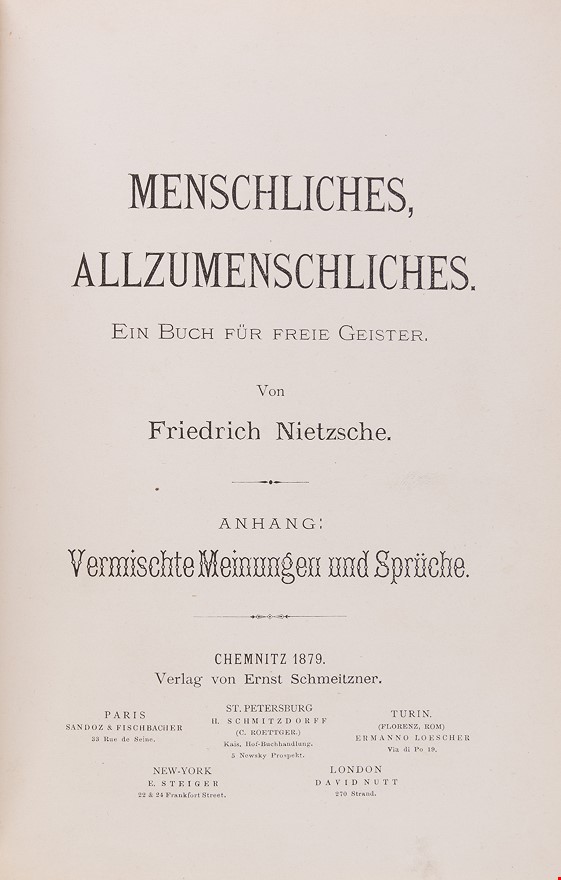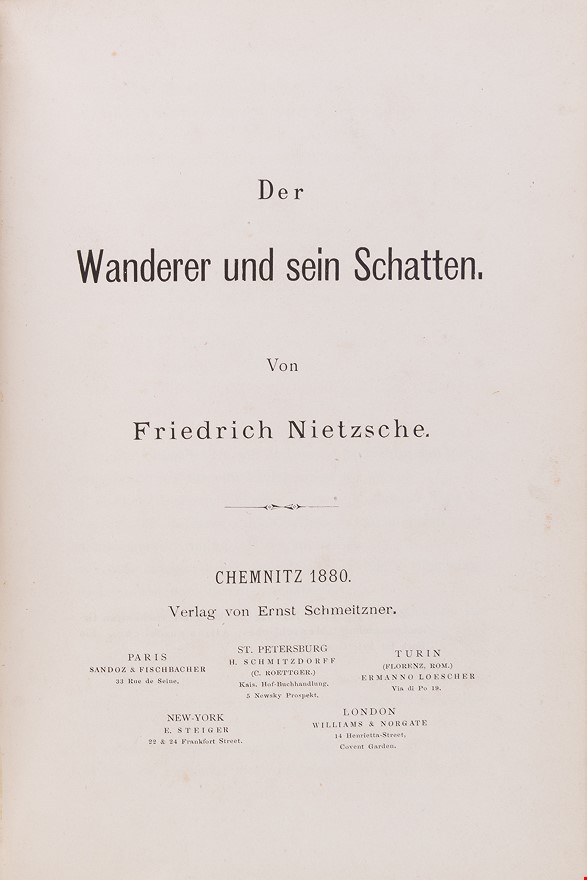Menschliches, Allzumenschliches. Ein Buch für freie Geister. [bound with:] Menschliches, Allzumenschliches, Anhang: Vermischte Meinungen und Sprüche. [and:] Der Wanderer und Sein Schatten.
NIETZSCHE Friedrich (1878, 1879, 1880.)
£4500.00 [First Edition]
Please contact us in advance if you would like to view this book at our Curzon Street shop.
First editions, first issues of all three parts of Human, All Too Human
First edition, first issue. 8vo (222 x 162mm). [8], 377, [3], pp. With the half title, the publisher’s advertisement leaf and Schmeitzner's pasted "eere" correction (p. 290, aphorism 431). Contemporary half brown cloth with dark brown cloth-backed boards, spine ruled and lettered in gilt, contemporary Germanic bookplate to the front pastedown (extremities worn, corners bumped). Chemnitz, Ernst Schmeitzner. 1878.
[bound with:] Menschliches, Allzumenschliches, Anhang: Vermischte Meinungen und Sprüche.
First edition, first issue. 8vo. 163, [1], pp. With Schmeitzner's pencilled "Opferthier's" correction (p. 35, aphorism 89), without the publisher’s advertisement leaves. Chemnitz, Ernst Schmeitzner. 1879.
[bound with:] Der Wanderer und Sein Schatten.
First edition, first issue. 8vo. 185, [1], pp. Without the publisher’s advertisement leaves. Chemnitz, Ernst Schmeitzner. 1880.
Rare first editions, first issues of all three parts of Human, All Too Human, Nietzsche’s first major aphoristic work, a radical departure in style and content that signalled the advent of the more polemical nature of his mature period. The series contained the first expressions of many of the concepts that would come to define Nietzsche's oeuvre, including: his rejection of Christian morality, for which the book was banned in Russia, that would come to form the basis of his conception of master-slave morality; his brand of perspectivism, that is, the rejection of the possibility of a-perspectival objectivity, dominant in philosophy at least since Plato; and the Will to Power, perhaps the most notorious, and certainly the most grossly abused, of all his key doctrines.
The series was written at a turbulent point in Nietzsche's life, during which he resigned his professorship at the University of Basel due to poor health and first came to fully express his disillusionment with Wagner. Upon publication of the final part, Nietzsche would remark that: “The ‘Human, All Too Human’ with the two supplements is the product of the time of my deepest and most continuous suffering – and it seems to me like a poem of complete good health. This is my triumph." (quoted in Schaberg, 1995, The Nietzsche Canon: A Publication History and Bibliography, pp. 75-6).
In reality, it signalled the start of a slow but steady fall in book sales, a decline that would see Nietzsche resort to the "vanity press" within a matter of years. Each of the three parts were published in ambitious runs of 1,000 copies, but would sell poorly - the third part, The Wanderer and His Shadow (published in December, 1879, but listed as 1880), was the "poorest selling book that Nietzsche produced up until the time he wrote the first book of Zarathustra" (Schaberg, 1995, p. 76). The remainders were eventually bought up by Nietzsche’s next publisher, E.W. Fritsch of Leipzig, in 1886 and reissued with new title-pages. Fritsch bought 511 copies of the first part, 775 of the second, and 808 of the third. The first issues are, therefore, significantly scarce, especially in the case of The Wanderer and His Shadow - even in 1886, there were only 192 copies in existence.
Schaberg 29, 31, 32.
Stock Code: 227324







